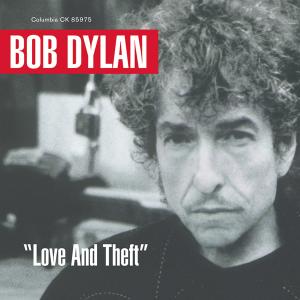
Love and Theft (2001)

1. Twiddle Dee & Twiddle Dum
2. Mississippi
3. Summer Days
4. Bye and Bye
5. Lonesome Day Blues
6. Floater (Too Much To Ask)
7. High Water (for Charley Patton)
8. Moonlight
9. Honest With Me
10.Po' Boy
11.Cry Awhile
12.Sugar Baby
If Time Out of Mind was Dylan’s haunted midnight confession, Love and Theft is its bright-eyed, whiskey-fueled morning after. Released five years after his unexpected return to critical prominence, this album did more than affirm Dylan’s late-period renaissance—it expanded it. Gone was the brooding introspection and echo-drenched melancholy of his 1997 effort. In its place: swagger, swing, and a curiously mischievous energy that saw Dylan diving headlong into the traditions he’d long studied, twisted, and made his own.
From the outset, Love and Theft is unapologetically American—not in the political sense, but in the mythic one. The instrumentation reads like a survey course in pre-rock vernacular: mandolins, banjos, honky-tonk piano, and Hammond B3 organ all jostling for space in a band that crackles with unforced joy. It is Dylan’s most accomplished flirtation with Americana since The Basement Tapes, yet this time, the looseness has given way to structure. The grooves are tighter, the arrangements more refined. One can sense a man not revisiting the past so much as romancing it—with a wink and a wry turn of phrase.
Dylan’s voice, now a well-worn rasp, has settled into its second (or third) life—less a limitation than a defining instrument. It growls, croons, lilts, and snaps, rarely beautiful in any traditional sense, but often strangely perfect. And lyrically, he is in inspired form. These songs don’t preach or unravel—they saunter. The surrealist density of earlier decades gives way to playful, cryptic storytelling and poetic pastiche. Dylan has always borrowed, but here he makes an art of it, weaving blues idioms, vaudeville tropes, and arcane references into something entirely, unmistakably his own.
Highlights abound. High Water (For Charley Patton) is a jittery flood of menace and momentum; Bye and Bye croons with a faded ballroom elegance; Po’ Boy is both absurdist joke and folk lament. And then there’s Sugar Baby, the record’s closing track—a sepia-toned elegy that drifts out like a final cigarette in an empty dancehall. Each song occupies its own little theatre, yet together they form a portrait of an artist both reverent and restless.
What’s remarkable is how little of the album feels self-conscious. This is not Dylan trying to impress the critics, or even reclaim his crown. It’s Dylan doing what he pleases, and in doing so, striking deeper and wider than many who’ve spent careers trying to stay relevant. That it won a Grammy and charted well is almost beside the point. Love and Theft didn’t just confirm the comeback—it made it permanent.
For the seasoned listener, it’s a revelatory feast. For the novice, perhaps surprisingly, it’s a welcoming doorway. Either way, it remains one of the most spirited, confident, and generous records of Dylan’s late career—a record that smiles even as it sizes you up.
Go back to the main page
Go To Next Review